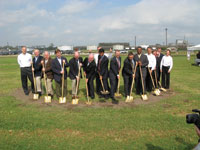Under the leadership of Governor Bobby Jindal and Louisiana Economic Development Secretary Stephen Moret, Louisiana has enjoyed an economic renaissance in the midst of a national recession. This is due in part to the state focusing its economic efforts towards increasing the state's economic competitiveness, cultivating Louisiana's top regional economic development assets, enhancing the competitiveness of local communities, helping retain and expand existing businesses, developing national-caliber business recruitment capabilities, telling the story of Louisiana's economic renaissance and cultivating small business and entrepreneurship.
Creating Vibrant, Diverse Economic Opportunities Louisiana ’s leaders in both the public and private sector have implemented pro-growth, pro-business economic reforms and policies to strengthen the state’s competitiveness, attract new growth industries, support small businesses and diversify the state’s economy.
Louisiana ’s leaders in both the public and private sector have implemented pro-growth, pro-business economic reforms and policies to strengthen the state’s competitiveness, attract new growth industries, support small businesses and diversify the state’s economy.
While the recession has stifled national investment, businesses from a diverse set of industries continue to invest in Louisiana. One example, Electronic Arts, the world’s leading interactive entertainment software company, recently established its first global quality assurance center in Baton Rouge. The company’s investment builds upon the momentum Louisiana has recently gained in the digital media sector and entertainment industry.
Although Louisiana is not immune from the national recession, Louisiana’s economy has remained on solid ground. Throughout 2008 and the first half of 2009, Louisiana enjoyed a successful period of economic growth and development. Louisiana’s job growth was higher and unemployment was lower than the Southern and national averages. Therefore, the state is well positioned to attract additional business investment and pursue targeted initiatives to increase its economic competitiveness, retain its existing economic-driver firms and cultivate new growth industries.
Due to its geography and abundant natural resources, Louisiana possesses a thriving energy sector. But the state is also beginning to attract business investment in alternative energy.
Finding an Alternative Solution
Louisiana's agriculture and forestry industries produce numerous products that are exported around the world. More importantly, they give the state a competitive advantage in bioenergy compared to other U.S. states. From sugarcane-derived ethanol to fuel produced from animal fats, Louisiana is a leader in the search for alternative energy.
Researchers at the LSU AgCenter's Audubon Sugar Institute are combining their knowledge of sugarcane processing and chemical engineering to develop a synergy between sugar production and ethanol. Some of the same technology used for producing ethanol from corn can be used to produce it from many other raw materials, including sugarcane and similar plants.
In October 2008, Dynamic Fuels LLC, a joint venture between Tyson Foods and Syntroleum Corp., chose to locate a first-of-its-kind facility to produce high-quality, renewable diesel and jet fuels from animal fats in Geismar, Louisiana.
"This is the first fuel production facility of this kind in the entire United States, and we are very proud to have it right here in Louisiana,” said Governor Jindal at Dynamic Fuels’ groundbreaking. Developing alternative sources of energy is a vital part of the future of our nation's economy, and as such, this investment here in Louisiana will serve as a catalyst for greater business expansion and job creation."
The fuel produced by the venture will offer the same benefits of synthetic fuels derived from coal or natural gas, including substantial performance and environmental advantages over petroleum-based fuels.
“We believe our fuels will appeal to the operators of fleet vehicles and city buses who want to reduce emissions, as well as the military and commercial airlines seeking ultra-clean renewable jet fuel,” said Jeffrey Bigger, director of Dynamic Fuels’ Management Committee.
Unlike the ethanol and biodiesel industries, which use food ingredients like corn and soybean oil to produce fuel, the Dynamic Fuels project will primarily use nonfood grade animal fats produced or procured by Tyson Foods, such as beef tallow, pork lard, chicken fat and greases. Production is scheduled to begin in 2010.
Meeting Demand for Clean Coal Technology
In the nation’s ongoing search for alternative sources of energy, a joint venture between ADA-ES and Energy Capital Partners is offering a valuable solution – clean coal technologies to reduce plant emissions.
 In 2008, the company broke ground in Northeast Louisiana on the largest activated carbon production plant in North America. Totaling $350 million in capital investment, this project will create 50 new jobs at an average salary of $50,000 to $65,000.
In 2008, the company broke ground in Northeast Louisiana on the largest activated carbon production plant in North America. Totaling $350 million in capital investment, this project will create 50 new jobs at an average salary of $50,000 to $65,000.
“We’ve enjoyed an excellent relationship with Red River Parish and Louisiana state officials who had the foresight to move this project forward for the benefit of its constituents in that it will help stimulate job creation and provide an overall economic boost to this part of Louisiana,” said ADA-ES President and CEO Michael Durham.
Headquartered in Littleton, Colorado, ADA-ES is a leader in clean coal technology and associated specialty chemicals. The company develops and implements proprietary environmental technology and specialty chemicals that enable coal-fueled power plants to enhance existing air pollution control equipment, maximize capacity and improve operating efficiencies.
Leading the Nuclear Renaissance
It has been roughly three decades since the construction of a new nuclear reactor in the United States, but several new reactors are planned for construction in the coming years. As the nuclear energy industry gains momentum, Louisiana will play a major role in nuclear component manufacturing.
The growing global demand for nuclear energy has necessitated a new approach to nuclear reactor manufacturing. The craft-based approach, wherein each reactor is uniquely designed and built from scratch, is giving way to standard manufacturing procedures. This shift will involve a limited number of key fabrication centers producing modular components for shipment to nuclear plants around the world.
The Shaw Group facility in Lake Charles, Louisiana, is one of these centers that will meet the global demands for these components. The Shaw Group, a Baton Rouge-based Fortune 500 company, is one of a limited number of U.S. companies with nuclear capabilities. It already provides engineering, procurement, commissioning, information management and project management services to four AP1000™ nuclear plants being built in China, and recently won contracts for four nuclear reactors planned for the east coast of the United States.
As the premier structural steel fabricator and the largest pipe fabricator in the United States, Shaw's new module fabrication facility will construct components for nuclear reactors, as well as have the capability to manufacture modules for chemical sites and petrochemical plants around the world.
Moret noted, "Due to a recent streamlining of the federal permitting process for nuclear reactors, increasing costs for traditional energy sources and likely greenhouse gas legislation at the federal level, the nuclear industry is poised for a renaissance in the United States."
A New Frontier for Business Investment and Opportunity
Louisiana’s energy industry has played a major role in its economy and will continue to do so because The Shaw Group, Dynamic Fuels, ADA-ES and other Louisiana businesses are developing alternative energy solutions and cultivating alternative energy innovation.
In addition to these projects, a number of promising major projects have been recently announced in Louisiana proving that the state is a new frontier for business opportunity and investment.
